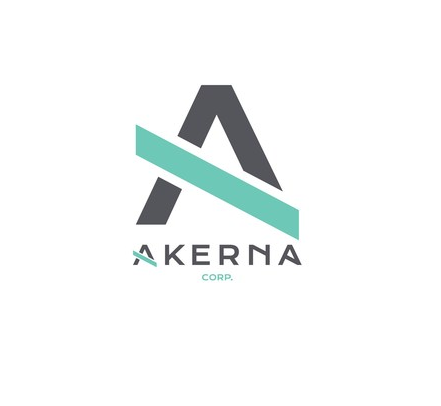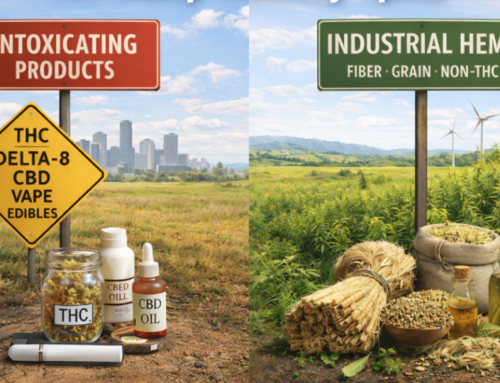Akerna Corp. Issues Letter to Shareholders
DENVER- Akerna (Nasdaq: KERN), a cannabis enterprise software company and developer of one of the most comprehensive technology infrastructures, ecosystems, and compliance engine powering the global cannabis industry, today announced the following letter from its Chief Executive Officer, Jessica Billingsley, to its shareholders and the investment community.
Dear Fellow Shareholders,
We are at the threshold of the next era of cannabis.
The cannabis industry has proven its resiliency and demand throughout the coronavirus pandemic, creating hundreds of thousands of new jobs, adding significant revenue to U.S. state economies, and receiving strong bipartisan support from Congress. While the timing remains elusive, we believe the debate around cannabis legalization in the US has shifted from “if” to “when” this eventuality will occur.
Today, regulations are widespread, determining the types of products to be sold, how many licenses can be issued, and how to manage product safety and usage. When federal legalization also comes to the U.S., we expect cannabis to be impacted in a way similar to other highly regulated commercial industries, with the inclusion of multiple layers of compliance and safety checks and balances throughout the supply chain.
Akerna has been at the forefront of preparing for the coming changes. At the heart of every decision we make, as your executive management team, is this question: “Does this provide value to the cannabis industry of tomorrow?”
Akerna is committed to being the best enterprise software solution available to serve both the cannabis industry of today and of tomorrow, seeking to account for every level of government regulation and every point in the supply chain.
We believe we deliver on this commitment in three main ways. First, we are actioning on our plan to deliver long-term value through the metrics we use and report, the strategic partnerships we cultivate and announce, and how we structure our product offerings to serve the growing enterprise market. Second, we are capitalizing on the three main growth drivers of the industry. Finally, we are preparing our technology for domestic and international countrywide legalization.
We intend to expand and solidify our position as the leading enterprise solution for the cannabis industry and execute a plan to deliver economic, social, and other business value. There are three central ways that you can measure our success in creating value: the metrics we use and report, the strategic partnerships we cultivate and announce, and the way we structure our product offerings to simplify the complexity of the industry.
The primary drivers of long-term value in our business include these three key performance indicators: Committed Annual Recurring Revenue (“CARR”), bookings, and transaction growth. It is key to clarify what each of these metrics means and why they are important.
Most of our revenue today is comprised of subscription revenue. As a result, the first metric we track to measure our present success is CARR, or the total amount of contracted annualized recurring revenue for which clients have signed contracts as of the end of the stated period, assuming any contract that expires during the next 12 months is renewed on its existing terms. Our CARR was $20.9M, as of December 31st, 2021, which represents a 51% increase year over year.
Our bookings and transaction growth metrics both measure the future value we are building in the business. Akerna’s reported bookings represents the dollar amount of new signed software contracts, the value of which will be recognized over the life of the contract. Growth in bookings is a near-term leading indicator of a subscription business’s performance. Our Q4 software bookings were $1.5M, a record for Akerna and more than a 50% increase over prior quarter, indicating increasing growth.
When we reference “transactions”, we are not only talking about transactions that take place over the counter between a retailer and a consumer. There are dozens of transactions that take place across the entire supply chain throughout the wholesale process before an item is placed on the shelf, ready to be sold to a consumer. These transactions are measured in two distinct ways: the dollar amount of any given transaction, and the number of transactions that take place.
Through measuring our clients’ transaction growth, we believe they are the industry leaders of tomorrow. Collectively, both their transaction dollar amount and transaction volume consistently grow between 25% – 50% year over year. These clients are scaling in two ways: expansion through acquisitions as they participate in the overall consolidation of the market, and “same-facility” growth; i.e., more consumers are visiting a given retail/dispensary, and/or increased frequency of visits.
We believe transaction growth is the single most important long-term leading indicator of our true market share, as we move closer to capturing transactional revenue through retail and wholesale payments.
Our strategic partnerships such as those with SAP, Oracle’s Netsuite, and Domo enable us to leverage a pool of shared resources to help our clients solve their problems of today and tomorrow.
To illustrate how quickly these strategic partnerships can evolve to provide additional value as the industry changes, let’s look at our partnership with Hypur, an omnichannel digital payments and compliance provider for the cannabis industry. This partnership stemmed from our shared understanding that the cannabis industry of today faces a major challenge when it comes to payments.
Non-compliant payment solutions such as so-called “Cashless ATMs” have proliferated in the cannabis market, taking advantage of the lack of alternative payment options accessible to operators. Securing our partnership with Hypur enables our customers to complete payments in a compliant manner. The challenges posed by non-compliant payment products has recently been reported on once again by Bloomberg on April 1 in an article exploring the use of illegal Cashless ATMs. Akerna does not offer a Cashless ATM product and has never derived revenue from such activities, nor do we partner nor integrate with Cashless ATM providers.
Compliant PIN Debit solutions are gaining mainstream popularity, especially among independent operators. We expect Hypur’s solution to continue to be a valuable payments-solution offering post-federal legalization.
While designing our ecosystem, we take care to use an approach that would not only address the needs of the small-medium sized business segment, but also those of the growing enterprise market. This decision allows us to grow with our clients as they scale from our small and medium business solutions into our enterprise offerings.
We focus on providing the network that connects applications with solutions for compliance, payments, and integrations. This structure enables our clients to custom-select the ecosystem-connected suite of products and services right for them at this point in their growth journey.
This ability to customize becomes increasingly important as companies grow to an enterprise level of complexity. Enterprise companies require tailored solutions that address needs specific to their organization and workflows. The predefined, one-size-fits-all, regional, compliance-only solutions that suffice for smaller businesses just getting started quickly become no longer suitable. Instead, enterprise companies evaluate software based on the return on investment gained by having superior reporting and analytics and by knowing their compliance needs are met today in each market in which they operate, including any into which they might aspire to expand.
As an example, a large multi-state operator might contract with us for our enterprise cultivation and manufacturing modules, our midmarket retail solution with e-commerce and loyalty features, and their preferred back-end financial solution. For this example, let us assume they choose the most popular mainstream tax and financial planning solution, Microsoft. This client can then choose from a suite of other products connected to our ecosystem to provide additional features and functionality. Perhaps they will add payments, a learning management system, route planning, or menu advertising from our ecosystem partners.
Across all our products and services, we are equipped to help serve operators in each of their verticals and in every phase of their growth cycle, large regulatory agencies, and brands looking to expand across the country.
Overall, the data is proving the success of this strategy. Our enterprise business is our focus, and this line of business is growing, as was shared in our recent 2021 earnings call.
We plan for the future by proactively responding to the core growth drivers of our industry today: operator consolidation, U.S. federal action, and international movement.
Consolidation is a reality in any emerging industry and cannabis is no exception. The consolidation within cannabis is prompted by two drivers: expansion into new states and/or scaling operations within existing states. Consolidation among operators that are also rapidly scaling drives technology adoption, the need for compliance within every market in which they operate, and the need for robust accounting, tax planning, and reporting analytics across all their facilities and markets.
U.S. federal action on cannabis has been long anticipated by the industry and the general public alike. As discussed in previous quarterly reports, we expect it to most likely be passed in pieces that resolve specific issues within the industry instead of sweeping legalization. Either way, we are prepared for the inevitable eventuality of federal legalization: an increase in regulatory complexity and an increase in the number of operators looking to scale quickly. Successfully ushering operators, governments, and brands into this new era of cannabis will require compliance, scalable technology, and a robust ecosystem.
International opportunity is also likely to come in waves of legalization. Our existing clients headquartered in North America, with their experience and access to capital, are likely to capture a large portion of the market expansion potential. We believe our technology systems can expand with them as they extend their footprint.
Our ecosystem is comprised of three distinct layers: the network, the applications, and the integrations. We fully own and operate both the network (the piece that connects the layers together through sharing data) and the applications (the core programs with which end-users interact). Our ecosystem leverages not only our own portfolio of products but also creates a net of value encompassing our 80+ integration partners.
Through our targeted strategic acquisition strategy, our product portfolio has grown to include a breadth of applications. We serve all types of operators, from one-location storefronts to the largest vertically integrated companies operating in multiple states and countries. We seek to grow with our clients, providing more value than we cost while meeting their technology needs every step of the way.
In 2022, we remain laser-focused on building long-term value for all stakeholders as defined and measured by the metrics shared earlier in this letter. We believe there are significant opportunities in both the domestic and international cannabis markets, and we continue to position ourselves to capitalize on these opportunities.
At Akerna, we remain grateful to our team members for their passion and hard work, to our clients for their confidence and commitment, and to you, our shareholders, for your support.
Sincerely,
Jessica Billingsley
Chair & Chief Executive Officer
Certain statements made in this release and any accompanying statements by management are “forward-looking statements” within the meaning of the “safe harbor” provisions of the United States Private Securities Litigation Reform Act of 1995. When used in this press release, the words “estimates,” “projected,” “expects,” “anticipates,” “forecasts,” “plans,” “intends,” “believes,” “seeks,” “may,” “will,” “should,” “future,” “propose” and variations of these words or similar expressions (or the negative versions of such words or expressions) are intended to identify forward-looking statements. Such forward-looking statements include but are not limited to statements regarding the expected timing and occurrence of federal legalization, Akerna being committed to being the best enterprise software solution for the cannabis industry of today and of tomorrow, Akerna seeking to account for every level of government regulation and every point in the supply chain, customizing our software for domestic and international legalization, key performance metrics like CARR, bookings and transaction growth being indicative of potential future growth, PIN Debit continuing to gain popularity and being valuable post-federal legalization, continued growth of our enterprise business, the ability of our technology systems to expand with our clients into new domestic and international jurisdictions, and any other statements expressing the views of Akerna’s management on future business results or strategy. These forward-looking statements are not guarantees of future performance, conditions or results, and involve a number of significant known and unknown risks, uncertainties, assumptions and other important factors, many of which are outside Akerna’s control, that could cause actual results or outcomes (including, without limitation, the results of Akerna’s contracts, strategic initiatives, and business plans as described herein) to differ materially from those discussed in the forward-looking statements. Important factors, among others that may affect actual results or outcomes, include (i) Akerna’s ability to recognize the anticipated benefits of being a public company, (ii) competition, (iii) Akerna’s ability to grow and manage growth profitably, (iv) Akerna’s ability to maintain relationships with customers and suppliers and retain its management and key employees, (v) costs related to being a public company, (vi) changes in applicable laws or regulations, (vii) Akerna’s ability to identify, complete and integrate acquisitions, including Viridian, and achieve expected synergies and operating efficiencies in connection with acquired businesses, (viii) and other risks and uncertainties disclosed from time to time in Akerna’s filings with the U.S. Securities and Exchange Commission, including those under “Risk Factors” therein. Actual results, performance, or achievements may differ materially, and potentially adversely, from any projections and forward-looking statements and the assumptions on which those vary from forward-looking statements are based. There can be no assurance that the data contained herein is reflective of future performance to any degree. You are cautioned not to place undue reliance on forward-looking statements as a predictor of future performance as projected financial and other information, are based on estimates and assumptions that are inherently subject to various significant risks, uncertainties and other factors, many of which are beyond Akerna’s control. All information herein speaks only as of the date hereof, in the case of information about Akerna, or the date of such information, in the case of information from persons other than Akerna. Akerna undertakes no duty to update or revise the information contained herein. Forecasts and estimates regarding Akerna’s industry and end markets are based on sources believed to be reliable; however, there can be no assurance these forecasts and estimates will prove accurate in whole or in part.
We use several key performance metrics in this press release.
We define contracted annual recurring revenue (“CARR”) as the total amount of contracted annualized recurring revenue for which clients have signed contracts as of the end of the stated period, assuming any contract that expires during the next 12 months is renewed on its existing terms. CARR includes the annualized value of contracted subscriptions and does not include non-recurring software revenue or revenue reported as “Consulting” or “Other Revenue” in our consolidated statement of operations. We have historically referred to CARR as “SaaS ARR” in our quarterly financial press releases. We are monitoring these metrics because they align with how our customers are increasingly purchasing our software solutions and how we are managing our business. The CARR metric should be viewed independently of revenue and CARR is not an indicator of future revenue.
We define bookings as the dollar amount of new signed software contracts, the value of which will be recognized over the life of the contract. We monitor growth in bookings as a near-term leading indicator of our business’s performance. Bookings should be reviewed independently of revenue and is not an indicator of future revenue.
We define transactions as the sale of cannabis goods recorded on our system, including sales between a retailer and a consumer and sales throughout the supply chain throughout the wholesale process before the consumer transaction. We define transaction dollar amount as the total dollar value of transactions that are tracked on our systems during the reported period. We define transaction numbers as the total number of transactions that are recorded on our systems during the reported period. Transaction dollar amount and transaction value do not relate to transactions by Akerna but to transactions undertaken by our clients tracked on our systems. We track transaction dollar value and transaction numbers as a long-term leading indicator of our market share. These metrics should be viewed independently of revenue and are not an indicator of future revenue.
(This information is primarily sourced from Akerna. Highly Capitalized has neither approved nor disapproved the contents of this news release. Read our Disclaimer here).



































